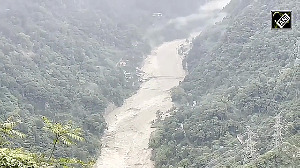A chlorine gas leak in the Jhajhra area of Dehradun triggered panic on Tuesday morning, forcing people to leave their homes, officials said.

The gas leaked from a cylinder kept in a vacant plot of land, they said, adding that security officials rushed people to safety after being informed about the incident and no damage was reported.
Uttarakhand Chief Minister Pushkar Singh Dhami has asked officials to investigate the storage of poisonous gas cylinders near a residential area.
The district control room was informed about the incident in the morning, the officials said.
The State Disaster Response Force (SDRF) commandant, accompanied by chemical, biological, radiological and nuclear experts with necessary equipment, rushed to the spot and found out that one of the four cylinders kept in the plot was leaking, the officials said.
National Disaster Response Force (NDRF) and fire brigade personnel were also called to the spot, the officials said, adding that people living in the nearby areas were rushed to safe locations.
The cylinder found leaking was buried in the ground after filling it with water, an NDRF official said.
Underground leakage of gas in water is subdued and does not spread much, he added.
"After the cylinder is completely emptied of its content, it will be buried under the ground with soil," NDRF Assistant Commandant Praveen Kumar said, adding that this was the safest and most effective option.
The personnel engaged in the operation and people in the area have been asked to use masks till even the faintest effect of the gas remains in the air, he said.
Kumar described chlorine as a choking agent which, if inhaled beyond a certain limit, can even be fatal.
Replying to a question from reporters, he said the administration alone can answer who kept the chlorine gas cylinders in a vacant plot near a residential area.
"All I can say is as the gas is highly poisonous, the cylinders should not have been kept close to a populated area," Kumar said.
Those inside their houses were asked to keep their windows and doors closed, he added.
When the leakage started in the early hours, the residents did not immediately realise it.
First there was a smell, followed by a burning sensation in the eyes and irritation in the throat, Sushma Rawat, a resident of the area, said.
She was alarmed when her dog began sneezing repeatedly and it grew louder as the night progressed.
"Someone from the neighbourhood then went out to check and found the cylinders lying in a vacant plot. The effect of the gas in the air was so strong that he could not even breathe and came back running," Rawat said.
She said she sent her daughter immediately to a relative's place to ensure her safety when an announcement was made by the administration.
The residents were shocked to find in the morning that even vegetables like radish, rai and palak growing in their kitchen gardens had withered due to the poisonous gas leakage.
Taking serious note of the incident, Dhami asked officials to investigate who kept the cylinders near a residential area and for what purpose.
The chief minister asked the industry and labour department officials to exercise special caution and ensure that such incidents do not happen again.
Vikas Nagar Sub-Divisional Magistrate (SDM) Vinod Kumar said the gas leak incident has been dealt with.

.jpg)









